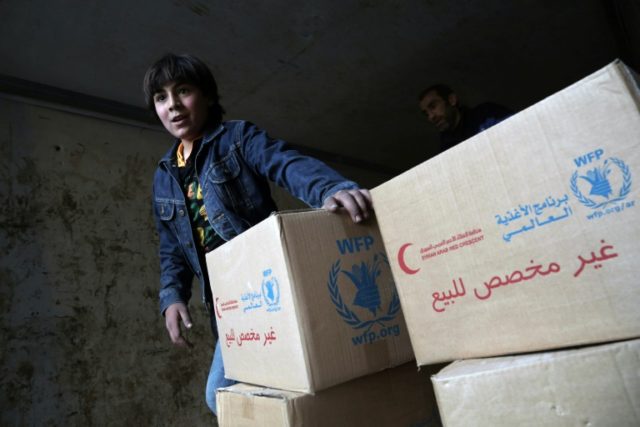United Nations (United States) (AFP) – The United Nations will on Sunday present a formal request to the Syrian government to approve airdrops of humanitarian aid to besieged areas where civilians are at risk of starvation, diplomats said.
UN aid chief Stephen O’Brien told a closed meeting of the Security Council on Friday that consent from the Damascus regime was needed to carry out the airdrops of food and medicine, diplomats at the meeting told AFP.
The 15-member council was discussing UN plans for airdrops to reach areas under siege where trapped civilians face dire shortages in the five-year war.
World powers decided last month that if aid continued to be blocked, the United Nations would begin airdrops on June 1, although such an operation would require Syrian approval and pose high risks.
“What is at stake here is the necessity to put an end to a humanitarian disaster,” French Ambassador Francois Delattre told reporters ahead of the meeting.
“The Syrian regime is continuing to systematically starve hundreds of thousands of civilians and use them as weapons of war. These are war crimes,” said Delattre, who holds the council presidency this month.
Diplomats said they expected the Syrian regime to take some time to respond to the request and UN officials have said the airdrops are not imminent.
Delattre called on Russia, Syria’s ally, to ratchet up pressure on Damascus to allow aid to reach civilians by land, which the United Nations has said is the most effective way to deliver aid.
“The top priority is to get those who have influence over Damascus, starting with Russia, to strongly increase their pressure on the regime,” he said.
France, Britain and the United States are calling on the United Nations to forge ahead with plans for the airdrops, even if the operation presents major security challenges.
“There should be airdrops where access is being denied by land,” said British Ambassador Matthew Rycroft.
The United Nations said Thursday that helicopters would have to be used for air bridges to 15 of the 19 besieged areas because they are densely-populated.
According to the United Nations, a total of 592,000 people live under siege in Syria — the majority surrounded by regime forces — and another four million live in hard-to-reach areas.
Peace talks to end Syria’s five-year war stalled in April after the opposition walked out over escalating fighting on the ground and lack of humanitarian aid.

COMMENTS
Please let us know if you're having issues with commenting.